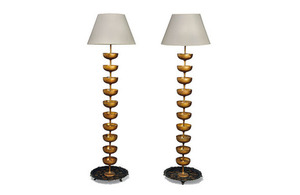Dalí’s Champagne Standard Lamps at risk of leaving the UK
Arts minister steps in to prevent ‘A Pair of Champagne Standard Lamps’ by Salvador Dalí and Edward James from export.

Arts Minister Michael Ellis has placed a temporary export bar on ‘A Pair of Champagne Standard Lamps’ by Salvador Dalí and Edward James to provide an opportunity to keep them in the country.
The lamps are at risk of being exported from the UK unless a buyer can be found to match the asking price of £425,000 + £15,000 VAT.
They are a collaboration between Dalí, one of the most influential artists of the 20th century, and Edward James, Dalí’s patron and a keen promoter of the Surrealist movement. In the view of the Committee, the lamps were arguably the most original and important examples of modern lighting designed in the UK.
The pair are one of two designed for Monkton House, Sussex, which was built in 1902 - 03 for James’ parents and designed by Sir Edwin Lutyens. It was home to the most important and influential Surrealist interior ever created in Britain.
One pair of lamps were made to flank the marble fireplace in the dining room at Monkton and would have stood adjacent to the Mae West Lips sofa, recently acquired by the V&A after a temporary export deferral was placed in November 2017.
The other pair of lamps is still owned by the Edward James Foundation.
Arts Minister Michael Ellis said:
Salvador Dalí is one of the great artistic pioneers of the 20th century. These lamps were created in the UK by Dalí and it is important that we keep them here.
I was delighted that the V&A was able to acquire the Mae West Lips sofa and I hope that we are able to find a buyer for the lamps so that they too can be saved for the nation.
The decision to defer the export licence follows a recommendation by the Reviewing Committee on the Export of Works of Art and Objects of Cultural Interest (RCEWA), administered by The Arts Council.
RCEWA member Richard Calvocoressi said:
The lamps are everything one would expect of Dalí. Witty, erotic – the champagne cups can be read as female breasts – the lamps are also strikingly sculptural, standing about the height of a person, with the line of vertical cups resembling a spinal column: a brilliant example of fantasy lighting.
The RCEWA made its recommendation on the grounds of the lamps’ close connection with our history and national life, their outstanding aesthetic importance and their significance for the study of furniture history, as well as the history of design and Surrealist art.
The decision on the export licence application for the lamps will be deferred until 31 August. This may be extended until 30 November if a serious intention to raise funds to purchase them is made at the recommended price of £425,000 + £15,000 VAT.
Organisations or individuals interested in purchasing the lamps should contact the RCEWA on 0845 300 6200.
An image of the lamps can be downloaded via our Flickr site.
ENDS
For media information contact: Faye Jackson Communications Officer Department for Digital, Culture, Media and Sport Tel: 0207 211 6263 Email: [email protected]
Notes to editors
-
Details of the lamps are as follows: Salvador Dalí (1904-1989) and Edward James (1907-1984) A pair of Champagne standard lamps modelled as stacked champagne glasses with tray bases decorated with ivy, some ‘glasses’ with removable half-section inserts gold-painted and lacquered brass Height: 63 in. (160 cm.)
-
Provenance: Made for Edward James by Green & Abbott in 1938. At Monkton House, West Dean Estate, West Sussex, until 1986, and then moved to West Dean House, West Sussex. The Edward James Foundation, West Dean, West Sussex.
-
The Reviewing Committee on the Export of Works of Art and Objects of Cultural Interest is an independent body, serviced by The Arts Council, which advises the Secretary of State for Digital, Culture, Media and Sport on whether a cultural object, intended for export, is of national importance under specified criteria.
-
The Arts Council champions, develops and invests in artistic and cultural experiences that enrich people’s lives. It supports a range of activities across the arts, museums and libraries – from theatre to digital art, reading to dance, music to literature, and crafts to collections. www.artscouncil.org.uk.